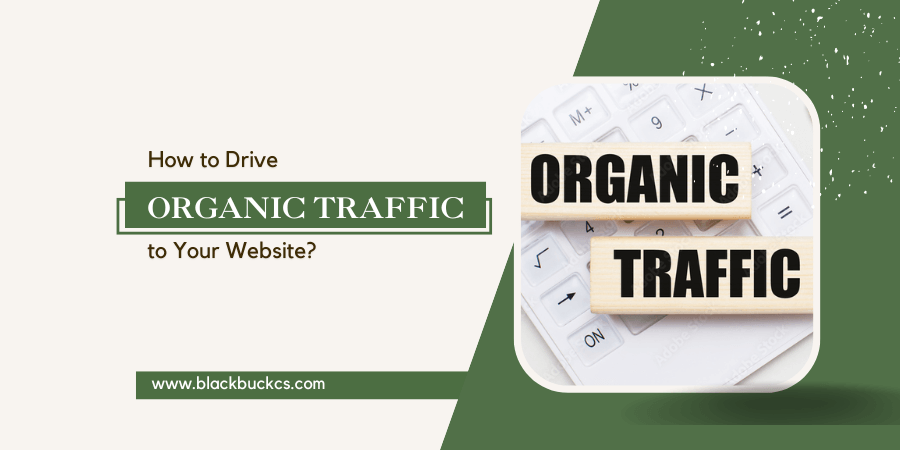
More than 50% of website traffic comes through organic search, leading to sales. Is your business getting enough organic traffic? Or are you still figuring out how to increase organic traffic to your website? Well, whatever the reason, our SEO expert has helped us gather the top 10 proven strategies to drive organic traffic to any website.
Whether you already have a share of organic traffic or haven’t gotten any, these tips will help you drive more organic traffic to the website. Before that, any business person and marketer must know about the factors affecting organic traffic. Only then will you be able to boost it.
| Key Takeaways: |
|---|
| > Organic traffic generates more quality leads with higher conversion rates. > Factors like page indexing, inconvenient URLs, poor content, and black-hat SEO practices can hinder your website’s growth. > With the right SEO strategy, you can increase organic traffic to your website. > Once you start your SEO campaign, it takes at least 4 to 6 months to drive organic traffic to your website. |
What is organic traffic?
Organic traffic is visitors who visit websites through search engines like Google, Bing, Yahoo, and others. It is an unpaid way of driving sales by attracting traffic to a website through an SEO strategy.
What are the factors affecting organic traffic?
Before we discuss ways to increase organic traffic to your website, you must understand the factors that affect organic traffic. Remember always to study and understand your website’s performance in organic traffic.
You can get that information with the help of Google Analytics or Google Search Console.
Moving ahead, here are a few factors affecting your website’s organic traffic:
Issues with page indexing
Page indexing is necessary to get visibility on SERP. Several results appear when you search for something on Google or any other search engine. However, if you don’t find your website in the results, you must first check if your page is indexed.
Poor website content
Poor content can also be holding back your website’s ranking. Content has always been the king of SEO and other digital marketing tactics. Your website must have appropriate and quality content that justifies the keyword and your brand. Why? According to different studies, quality content is considered one of a website’s most important ranking factors.
Another reason for your website’s low organic traffic can be black-hat SEO tactics. Are you ever using or are you still using black-hat SEO tactics? If yes, then you might get your website blocked. Black-hat SEO practices include keyword stuffing, link stuffing, duplicate content, unnatural link building, hidden content, and others that violate search engine guidelines.
Inconvenient website
There may also be a problem with your website’s user-friendliness that is hindering organic traffic. According to the studies, mobile-friendly and user-friendly websites can rank higher on search engine result pages (SERP). It helps users navigate the website quickly, doesn’t bore them, and solves their problems.
Uncertain URLs
This reason is more technical. If you get organic traffic after doing everything, you should check your URLs. Uncertainty or duplicate URLs can confuse search engines about what page to rank. There might be webpages optimized for the same keyword and with the same URL.
How do we increase organic traffic to the website?

Let experts at BlackBuckCS help you drive more organic traffic to your website now that you know the factors affecting it. In this section, we will discuss a few search engine-approved tactics to help you rank higher and, again, generate more organic traffic to the website.
1. Write quality and relevant content
We have said many times that content is everything when it comes to generating organic traffic. Quality content is no cakewalk; you must deep-dive into the research part and write content that justifies the audience’s search intent.
You must also ensure your content is engaging and keeps the reader attached to the end like you are here. You can also hire content writing services to help you drive more organic traffic.
2. Target keywords wisely
Imagine searching for SEO services and not finding your webpage on the SERP! Yes, that’s possible if you haven’t focused on the right keywords that address your target audience. You can also leverage long-tail keywords to support the content and primary keywords.
We all know keywords are the most essential part of any SEO strategy. They help you rank on the search engine result page and increase organic traffic. Hence, target your keywords wisely.
3. Repurpose old content
No one likes to read old content. For instance, if you are searching for content writing services to boost your business, would you love to read an article published in 2021 or the current blog written in 2023? The latter one.
That’s the reason you need to refresh and repurpose your old content. While updating previous content, you should update the statistics and facts, look for broken links, revise internal links, and much more. Repurposing doesn’t mean changing the date; it means updating the article with the latest information.
4. Leverage the benefits of social media platforms
Today, most people make decisions by looking at a company’s social media profiles. As per the survey report on G2, 39% of Gen Z consumers say TikTok directly influences their purchasing decisions.
You can leverage the rise of influencer marketing or start a Podcast or YouTube channel to educate about your product. Use social media platforms to get the maximum benefit out of them. Your social media handle can provide better customer service and increase your retention and conversion rate.
5. Focus on technical and on-page SEO
It would be best to look at both the website’s technical and on-page SEO. Both will help you rank higher and optimize your user experience. On-page SEO includes having SEO-friendly and quality content, meta titles, descriptions, header tags, image alt-text, and URLs.
Technical SEO is all about the website’s backend. The best approach is to keep your core web vitals in the green zone, from mobile-friendliness to page speed. With all these perfect and according to search engine guidelines, no one can stop you from ranking higher.
6. Build quality backlinks
Building quality backlinks is a part of off-page SEO. It can establish you as a credible, authoritative, and thought leader and increase your website’s exposure.
Organic traffic comes when you are ranking higher on SERP. Your website must gain credibility and authority by linking highly authoritative websites to it. You can build backlinks with an effective outreach blogging strategy or submit guest posts on other high-authority websites in the relevant niche.
7. Analyze your website regularly
Regularly analyzing your website can give you insight into minor details you might miss during monthly analysis. When you check your website’s performance daily, you will notice a slight change in web traffic with the implementation of specific SEO tactics.
And with that insight, you can plan your next strategy more precisely. In short, analyzing a website will help you make a more accurate, data-driven decision.
8. Improve your website’s loading speed
Having a quick-loading page speed will improve the overall performance of the website. No one likes to wait and look at a blank screen while your website is loading. This will increase your bounce rate and negatively impact users’ perceptions of your brand.
Make sure you have optimized your website speed for both desktop and mobile. With the era of 5G, a slow website won’t take you anywhere. Also, it is one of Google’s most important ranking factors.
9. Try different forms of content
Textual content is not everything. You can be creative and try different forms of content, such as infographics, podcasts, video content, and others. This will keep the audience engaged on your website and move them toward the final stage of the marketing funnel.
Drive Organic Traffic to the Website and Grow Your Business
To be successful online in this digital era, you must drive more organic traffic to your website. By implementing the abovementioned strategies, you can increase your website’s visibility on search engines and attract and retain visitors interested in your products or services.
At BlackBuckCS, we provide digital marketing services to help businesses drive organic website traffic. Our team of experts can help you develop a customized strategy that aligns with your business goals and ensures maximum ROI.
So, what are you waiting for? Contact us today to learn more about our digital marketing services and how we can help you drive organic traffic to your website!
FAQs on driving organic traffic to the website
1. How long does it take to generate organic traffic?
The average time to generate organic traffic through SEO practices is about 4 to 6 months from the start of your campaign.
2. How to measure organic traffic success?
Well, some tools can help you understand the success of organic traffic. You can see the metrics through SEO tools like Google Analytics or Google Search Console.
3. Does organic traffic convert better?
Yes, organic traffic converts better because visitors who land on your page through organic search or even social media are more engaged and looking for the solution.
4. How can I increase my organic traffic fast?
There’s no fast way to increase your organic traffic, but following tactics like updating quality content, targeting people, asking questions, focusing on page speed, and staying active on social media might do the trick.
5. How can BlackBuckCS help in boosting organic traffic on the website?
We have a team of experienced SEO experts who will build a customized SEO strategy for your brand and can help you with content writing services.
6. How can I increase direct traffic on my website?
You can increase direct traffic through paid ads, email, and social media marketing.
